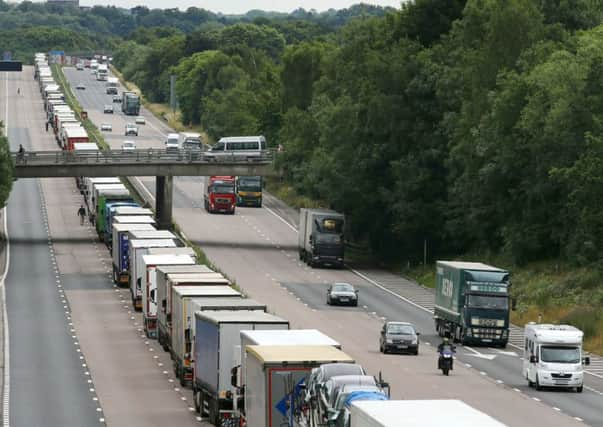Rachel Reeves: Brexit '“ no one voted to be poorer, or for jobs to be lost, if we left the EU.


Last week, the Prime Minister’s spokesman was forced to deny that troops could be deployed to distribute food and medicine if negotiations for an exit deal from the EU failed.
Those who campaigned for Britain to leave the EU dismiss these reports of looming chaos after exit day on March 29, 2019, as scare stories.
Advertisement
Hide AdAdvertisement
Hide AdBut we are now starting to see what Brexit will really mean through Government decisions that directly affect people across our region.
Remember the Brexit campaign’s promise that leaving the EU would mean £350m extra a week for our NHS, starved of cash after eight years of Tory government?
The Vote Leave campaign also suggested alternative uses for the money could mean more money for flood defences in the wake of Storm Eva which brought severe flooding to Yorkshire.
Yet Brexiteer and Environment Secretary Michael Gove has just rejected the flood scheme we need for Leeds in favour of a second-rate option that will not adequately protect the city against even the type of floods we saw on Boxing Day 2015.
Advertisement
Hide AdAdvertisement
Hide AdIt turns out – just like the promised extra money for the NHS – the idea there would be extra cash for flood defences was another myth.
While those in favour of leaving the EU continue to insist everything is rosy, time is fast running out to avoid Britain crashing out of the EU without a deal.
That outcome would see us go straight to World Trade Organisation trade rules and mean thousands of shipments every day would have to be checked by customs instead of being allowed free and open access as they are now.
There are just 75 days left until a key EU meeting on October 18 by which time we need a withdrawal deal in place to ensure it can be ratified in time for March 2019. Time is running out. In my role as chair of the Business Committee in the House of Commons, I have asked many business leaders to outline what Brexit could mean for them and their employees.
Advertisement
Hide AdAdvertisement
Hide AdPaul Everitt, who represents Britain’s aerospace industry, warned failure to get a Brexit deal would leave British aerospace in a “chaotic” regulatory no-man’s land. Asked if he could be certain that passengers who had booked flights after March 2019 would be able to take off, he said: “The truth is I can’t tell you.”
For anyone who has booked a holiday abroad next year, the idea British planes could be grounded by a hard Brexit is alarming.
The Food and Drink Association said a no deal Brexit would be disastrous. Drinks manufacturer Diageo warned a 15-minute delay for each truck at the border between Ireland and the UK would add £1.3m a year to the cost of producing the drink Baileys. One-third of everything in an average shopping trolley at Asda comes from the EU.
The car industry is equally worried. Honda warned every 15 minutes of delays could cost some manufacturers up to £850,000 a year – because they rely on 350 trucks arriving each day from Europe to keep its huge factory in Swindon operating.
Advertisement
Hide AdAdvertisement
Hide AdThose extra costs inevitably get passed on to consumers. Witnesses told us new tariffs could add £1,500 to the cost of a new car.
Aston Martin’s finance chief Mark Wilson said a hard Brexit could have the “semi-catastrophic effect of having to stop production”.
The warning we received from Britain’s pharmaceutical industry was that post-Brexit border delays would put time and temperature sensitive treatments at risk. With almost three-quarters of pharmaceutical imports to the UK coming from the EU, British patients’ access to medicines would also be in jeopardy.
All these warnings did not come from politicians. They came from a range of business people who know their industries inside and out. We should take their warnings very seriously. They outlined just what a disaster leaving the EU without a deal would be and the risks it posed to all the goods and services that we rely on.
Advertisement
Hide AdAdvertisement
Hide AdYet, Theresa May and the Government are precariously close to doing just that as her divided MPs continue to argue among themselves.
In the remaining 75 days before that EU meeting in October, the Government must now work with our European partners to get a workable deal and avoid a cliff-edge Brexit.
Hands up, I voted for Britain to remain in the EU. And the evidence I have seen since the referendum leaves me even more certain that Britain’s best interests and future prosperity are best served by maintaining close ties to our EU partners.
Like many I want restrictions on the free movement of people, but I also believe we should stay in the single market and the customs union to help us trade freely with out biggest market.
Advertisement
Hide AdAdvertisement
Hide AdIt is crucial the Government secures an exit deal in the weeks ahead and gives Parliament a vote on that deal.
No one voted to be poorer, or for jobs to be lost, if we left the EU. But that’s the very real risk we all face if we are plunged into the uncertainty and chaos that would undoubtedly result from a no deal Brexit.
Rachel Reeves is the Labour MP for Leeds West. She chairs Parliament’s Business, Energy and Industrial Strategy Committee.